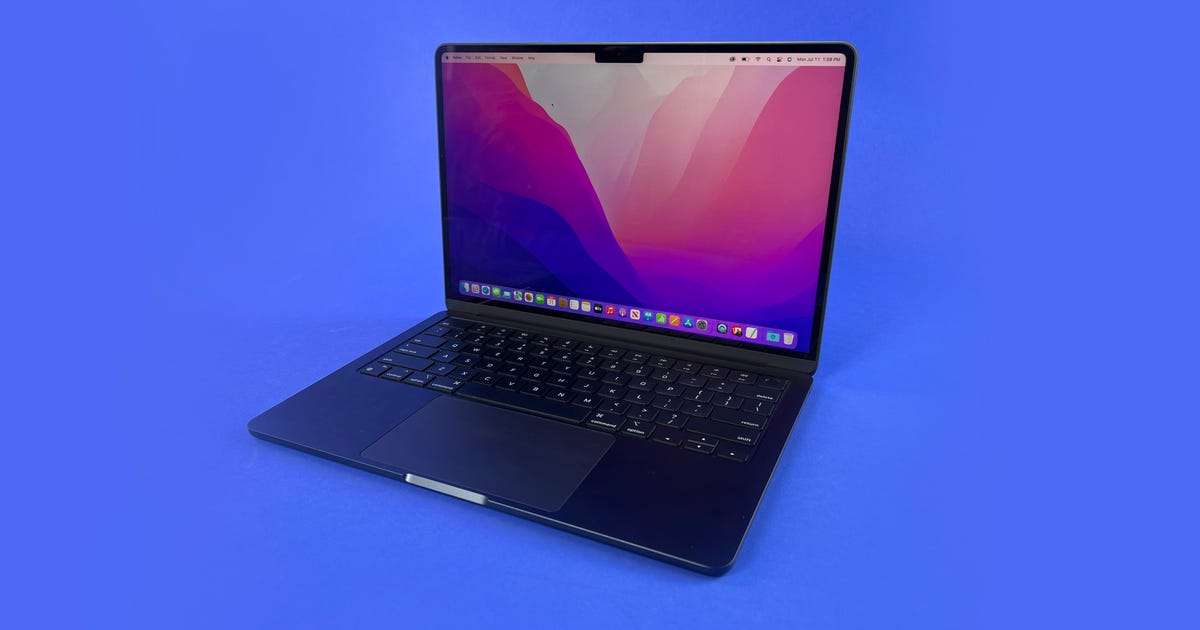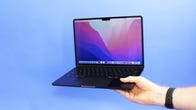MacBook Air M2 Review: Better Camera and Bigger Screen Outshine a Faster Chip
Even though it costs $200 more than its immediate predecessor, I still think the new M2 version of Apple’s MacBook Air is a great default starting place when you begin your laptop search. In the 14 years since the MacBook Air line launched, I’ve often described it as “the most universally useful laptop you can buy.” That’s because the Air has always attempted to hit a delicate balance between price, portability, ease of use and features. And since 2008, Apple has succeeded in nailing that formula more often than not.
Thanks to a new design, a larger display (13.6 inches versus the previous 13.3 inches), a faster M2 chip and a long-awaited upgrade to a higher-res webcam, I feel comfortable keeping that “universally useful” title for the new 2022 version of the MacBook Air, with one caveat. At $1,199, the $200 increase over the traditional $999 MacBook Air starting price is a disappointment. Note that we’re reviewing the step-up $1,499 configuration, which adds more GPU cores and more storage space (but still only includes 8GB of RAM).
In head-to-head testing against both the still-available M1 version and the recently released 13-inch M2 MacBook Pro, its performance falls in the middle, and while it gets a nice power bump over the 2020 M1 Air, it’s not significant enough that I would upgrade just for that.
Like
- Bigger, brighter screen
- Modern design with new colors
- A high-res webcam, at last
- Excellent performance and battery life
Don’t Like
- More expensive than the model it replaces
- New power adapter is a paid upgrade on some configs
- New webcam adds a screen notch
And yes, it’s good that the previous M1 Air, with an older design, remains available at $999. That somewhat mitigates the price increase on the new version, but you’re inevitably going to be drawn to the new design and features. The latest MacBook Air represents the biggest overall change to the product line, arguably since 2008, but at least since 2018. That’s when the Air gained modern features like a higher-res screen and fingerprint reader. In 2020, the Air switched from Intel chips to Apple’s own M1 chips, but without a physical redesign.

The M2 MacBook Air next to the M1 Air.
Dan Ackerman/CNET
That still-available 2020 M1 MacBook Air, one of the first set of Macs to move from Intel to Apple Silicon, is not a bad-looking machine, but it’s based on a design that launched in 2018, which is roughly forever ago in computer terms. The new version moves from that traditional tapered design to the boxier, blockier look of the 14-inch and 16-inch MacBook Pro laptops from late 2021. It’s a more modern, more constructivist design that largely rejects decorative stylization. Hands down, I like it. But that might be because I’m just so used to the classic MacBook Air design that any change feels refreshing.
The configuration we tested
| Price as reviewed | $1,499 |
|---|---|
| Display size/resolution | 13.6-inch 2,560×1,664 LED-backlit display |
| CPU | Apple M2 8-core CPU/10-core GPU |
| RAM | 8GB |
| Graphics | 10-core Apple GPU |
| Storage | 512GB SSD |
| Networking | 802.11ax Wi-Fi 6 wireless networking IEEE 802.11a/b/g/n/ac Bluetooth 5 |
| Operating system | MacOS Monterey 12.4 |
Note that there’s still one odd man out in the lineup. The new-for-2022 13-inch MacBook Pro adds the same M2 chip found here, but keeps the vintage 2016-era body, complete with the all-but-extinct TouchBar and 720-resolution webcam. It’s perfectly fine, but I’d be hard-pressed to think of many reasons you’d choose it over the new Air (although there are a few).
Read more: MacBook Pro M2 13-Inch Review: Familiar Design, New Apple M2 Chip
The new MacBook Air goes beyond the Pro models it mimics in one important respect — it adds new colors to the space gray and silver, with a new gold Starlight and a deep, dark Midnight finish. That Midnight, which appears as a matte black finish, reminds me of the old matte-black polycarbonate MacBooks of the mid-2000s, which I’ve always thought was a very sharp look.
The new Air’s footprint is a hair smaller than before, and it feels slimmer. It’s 11.3mm thick overall, while the previous design tapered thinner at the front, but grew to 16mm at its rear hinge. It’s also a bit lighter, at 2.7 pounds versus 2.8 pounds.
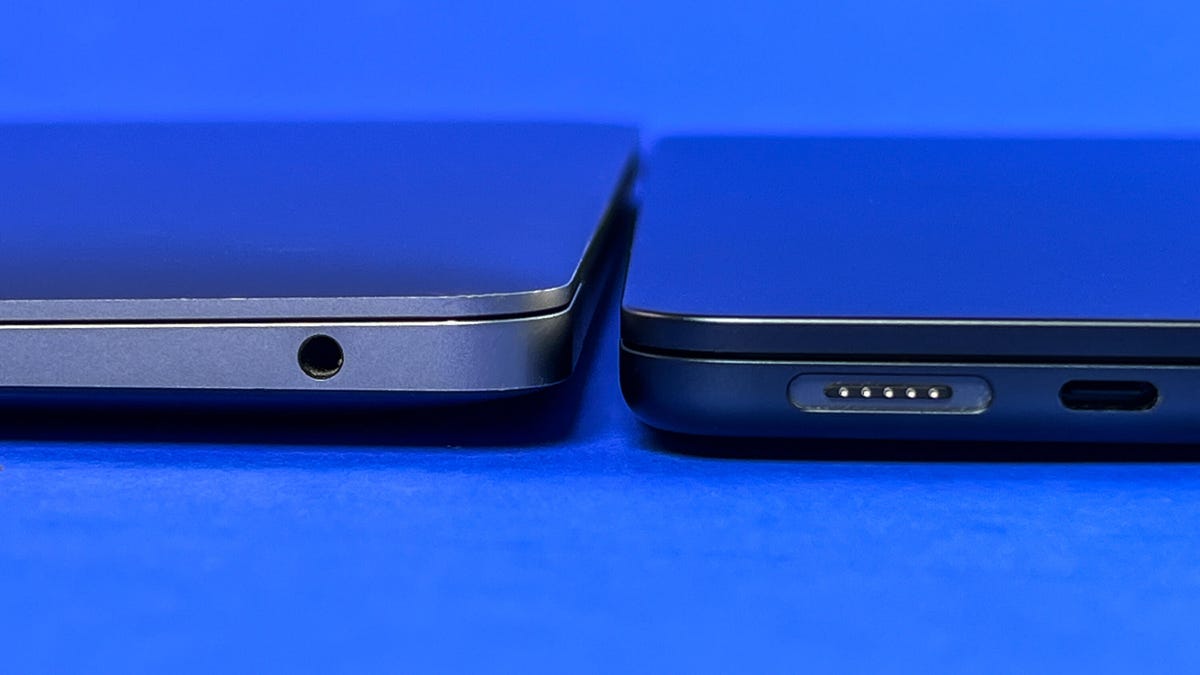
The M2 Air is slimmer at the rear hinge than the old design.
Dan Ackerman/CNET
That’s a lot of different MacBook models, prices and specs to keep track of. To sum it up, the key reasons you’re going to prefer the new Air over the previous model are:
- Slimmer, more modern design in new colors
- Upgraded full-HD webcam
- Larger, brighter display (13.6 inches versus 13.3 inches)
- Faster M2 processor
It also adds the new MagSafe power connection also found in the 14-/16-inch MacBook Pro, and some configurations include a new 35W dual USB-C port power adapter. It’s compact and has two USB-C ports built right into it — one for the power cable to the laptop, and one free one for anything else you need. If you buy the least expensive M2 MacBook Air configuration, it’s a $20 add-on upgrade. Otherwise, you just get the standard 30W MacBook brick.

The MacBook Air has always been my favorite coffee shop companion.
Libe Ackerman
The street test: Portable and powerful
A MacBook Air is fine for sitting at a desk at home or in the office, but it’s really a laptop that needs to be on the go with you to shine. So it came with me, to the coffee shop, on the subway, to the office and more.
The regular Air was always a fine travel companion, but frankly newer, lighter laptop designs have been more travel-friendly. For example, I’ve had an excellent time taking the tiny Surface Laptop Go 2 around with me, even on a cross-country flight. Of course, the ultimate travel laptop, at least for me, was the late 12-inch MacBook, sadly discontinued before it could find its audience.
The new Air is only slightly smaller and lighter than its predecessor, so don’t expect a revelatory experience. But it’s a great fit for my small travel bag, and I wouldn’t object to taking it on a daily commute.
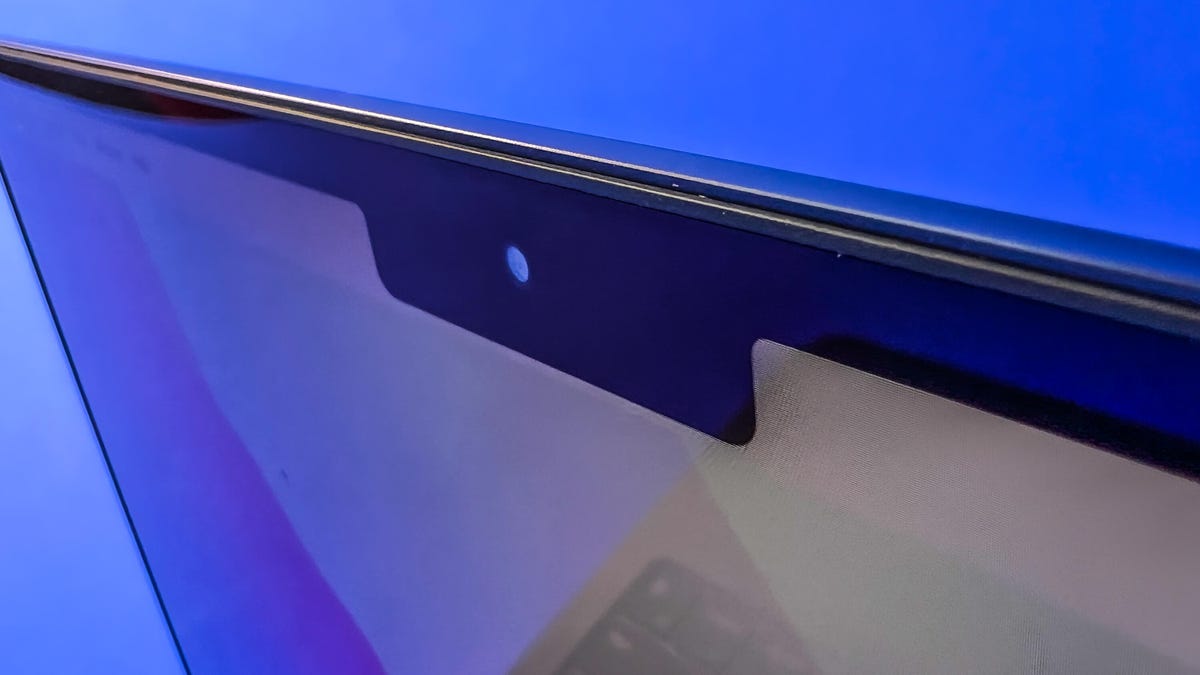
That notch…
Dan Ackerman/CNET
The brighter screen — similar to the ones on current MacBook Pro laptops — helped when I had to crank up the brightness to write outdoors. The slightly larger screen, which measures 13.6 inches diagonally where the previous model was 13.3 inches, also aids visibility. Yes, I’ve gotten to the age where most of my Google Docs are at 125% by default, so a bigger screen definitely helps. However keep in mind that the webcam is going to knock a little notch into the screen, much as it does on the iPhone and some MacBook Pro models.
After seeing the new MacBook Air in person for the first time at Apple’s WWDC event in June 2022, I knew I had to try the Midnight color. Apple doesn’t describe it precisely, but I’d call it a matte black with a hint of a blue tint. It took me back to one of the very first MacBooks (and one of the first Intel Macs), the black polycarbonate model I first reviewed in 2006. I actually found one of these a few years ago, in 2018, and it booted up and worked, although the battery was shot.
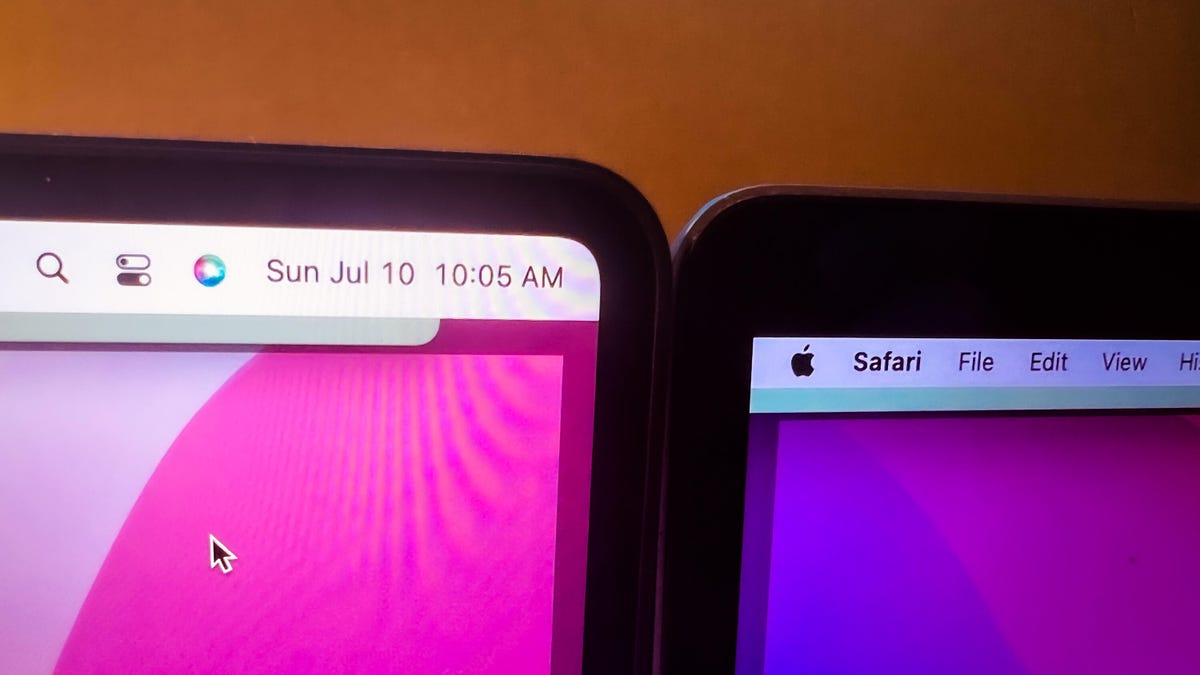
The 13.6-inch display fits more screen into about the same space.
Dan Ackerman/CNET
It’s a great look, and stands out nicely from the sea of nearly identical laptops that are all either silver, gray or … silver-gray. Some models experiment with dark interiors or garish lid illustrations, but there’s generally a lot of zigging and not much zagging out there.
The Midnight version of the MacBook Air has a sharp, modern look, but there’s one catch. Let me explain.
Reader, I am no greasy-fingered vulgarian. You’ll have to take my word for that. But I could barely breathe on the Midnight MacBook Air without leaving smudges and fingerprints all over it. It’s a common issue with dark matte objects, and I had to give this laptop a thorough wipedown before snapping each photo. I felt obligated to carry a cleaning cloth with me everywhere, and I’d advise you to do the same.
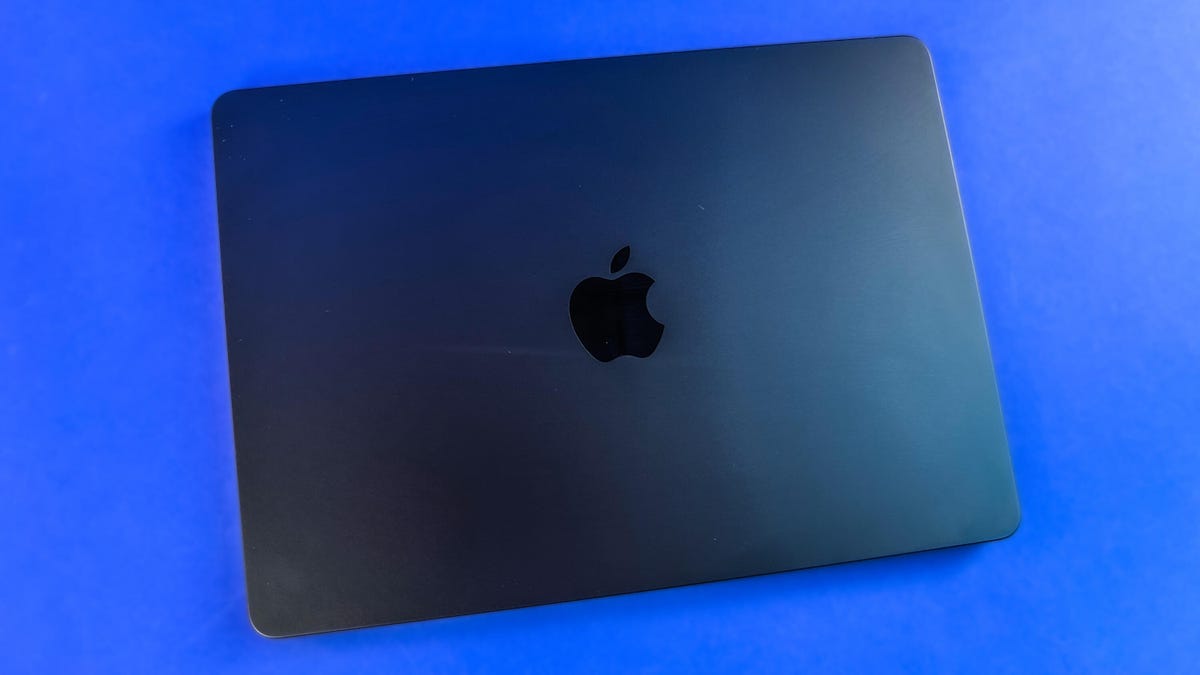
Keep a cleaning cloth handy for the fingerprint-prone matte finish.
Dan Ackerman/CNET
M2 vs. M1, M1 Pro, M1 Max
The performance story this laptop tells is a predictable one. That’s because we’ve just tested and reviewed the new 13-inch MacBook Pro, which also runs the M2 chip. Plus, we’ve been testing and reporting on every M1 iteration since 2020, including the original M1, the M1 Pro, the M1 Max and the M1 Ultra (which is just a double M1 Max).
Read more: MacBook Air M1 vs. MacBook Air M2
The most important thing to clarify here is just where the new M2 chip falls in the Apple Silicon lineup. Basically, it sits above the original M1 chip (which, like the M2, is available in two versions with different numbers of graphics cores), but below the M1 Pro, M1 Max and M1 Ultra. The M1 Pro and M1 Max are available in the 14-inch and 16-inch MacBook Pro. The M1 Ultra, essentially two M1 Max chips side by side, is only available at the moment in the new Mac Studio desktop.
Read more: Best MacBook for 2022
The story here offers no surprises. The M2 MacBook Air outperformed the 2020 M1 MacBook Air by a modest, but not breathtaking, amount. The M2 version of the 13-inch MacBook Pro, just about a month younger than this machine, performed slightly better in some tests than the Air. Why? Probably because the Pro has a fan, which Apple refers to as “active cooling,” and which means the chip can run faster, longer, without having to throttle itself to cool down. The 2020 and 2022 Airs we tested also had only 8GB of RAM (yes, for $1,500, you still only get 8GB). Performance charts comparing the results from the 2022 MacBook Air with other laptops are at the end of this review.
Would I trade the design elements, webcam, bigger screen and other upgrades for the slightly faster M2 MacBook Pro performance? I would not. If you think you’ll be hitting the ceiling of M2 performance, then you’re more likely in the market for a 14-inch MacBook Pro or a Mac Studio.
Read more: MacBook Air vs. MacBook Pro
In my short time so far with the MacBook Air, I’ve thrown a few Photoshop projects at it and run some Mac games via Steam. I appreciated the larger screen for my photo work, and as for gaming, the still-unfinished Baldur’s Gate 3 is probably the newest, most high-profile game you’ll play. Mac gaming remains its own thin little pocket universe. The system ran in our a video-streaming battery test for 17 hours and 20 minutes, which is just about the same as Apple’s estimate. The M2 MacBook Pro ran even a few hours longer on the same test. After we run additional battery tests, I’ll update these numbers as needed.
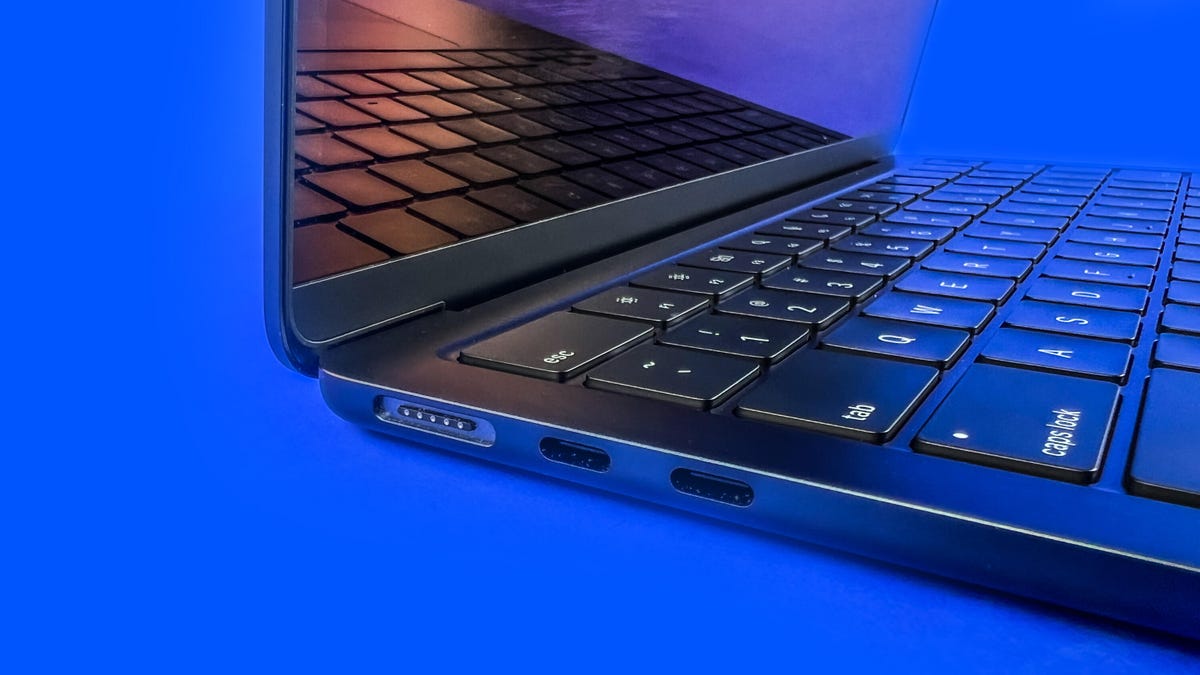
MagSafe makes its MacBook Air return.
Dan Ackerman/CNET
Quality of life issues: Webcams and power bricks
Two other new features are making a MacBook Air appearance here. One is vitally important, the other more of a nice extra.
The Air now gets the updated MagSafe 3 power connection found on the 14-/16-inch Pro (and absent from the M2 13-inch MacBook Pro). That’s in addition to the two USB-C/Thunderbolt ports on the left side. Now, I loved the original MagSafe, which was on the Air for several years, but in the modern USB-C era, I almost never use it, opting instead to use any of the dozens of standard USB-C power cables I have sitting around. The universality of laptop chargers is one of the greatest developments in power cable history, so of course Apple had to go and add a proprietary cable back into the mix.
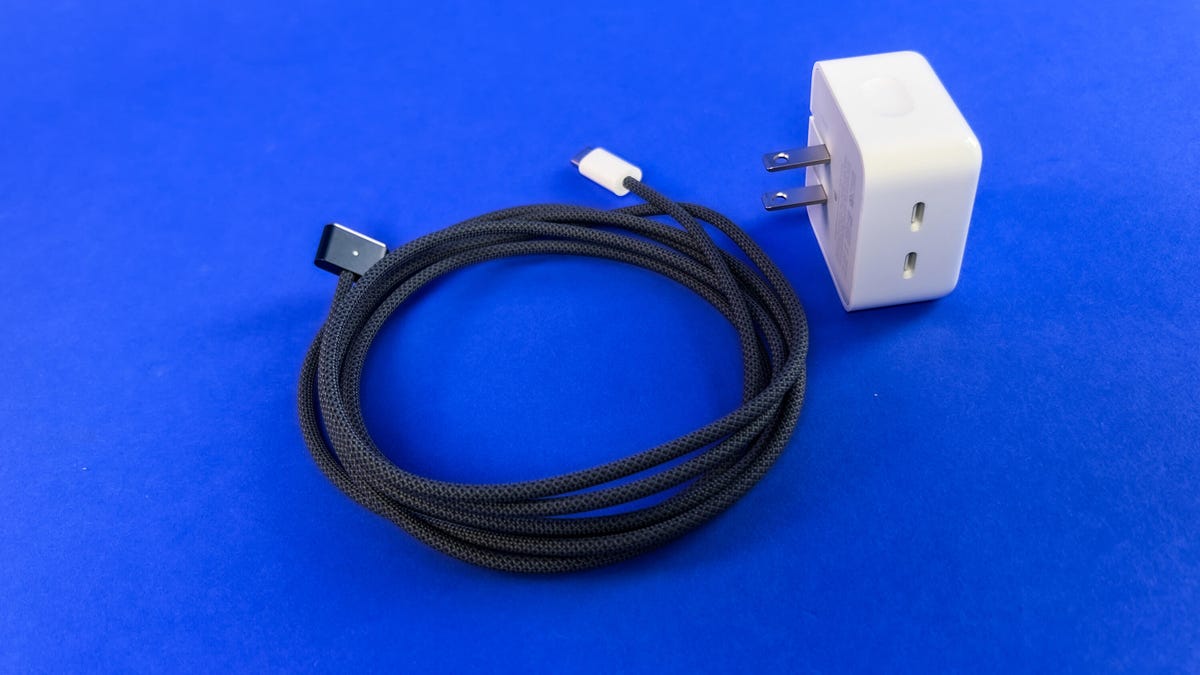
The pleasingly small new 35W charger.
Dan Ackerman/CNET
Of course, you don’t have to use the MagSafe cable, you can use just about any USB-C charger instead. That said, the MagSafe cable is now color-coordinated with the Air, so my cable was Midnight. Also note that the $1,199 base model doesn’t use the new 35W adapter, but instead an older 30W design. The upsell version of the Air does include the new charger, which is pleasantly compact and includes two USB-C ports (one for the power cable and one extra). You can add it to the base model for an extra $20, or jump to the big 67W adapter for the same $20.
Much more important to me is the new 1080-resolution webcam. It’s the same hardware as the 14-/16-inch MacBook Pro camera, which is excellent, and a huge step up from the 720 camera MacBooks have been stuck with for years.

The 1080 camera in the M2 MacBook Air (left) has better resolution and image processing than the 720 webcam in the M1 Air (right).
Dan Ackerman/CNET
It’s a change too long in coming, but a welcome one, and that leaves the M2 13-inch MacBook Pro and the M1 MacBook Air as the sole MacBooks left with the older, inferior camera. In this simple side-by-side comparison you can see the difference. In our Zoom-addicted future-of-work world, it’s a must-have.
Of all the upgrades, changes and improvements in the new MacBook Air, that’s probably the one I’d be most unwilling to give up.
Originally published July 14, 2022.
Geekbench 5 (multicore)
Apple MacBook Pro (14-inch, M1 Pro, 2021)
Apple MacBook Pro (13-inch, M2, 2022)
Apple MacBook Air (13-inch, M2, 2022)
Apple MacBook Air (13-inch, M1, 2020)
Note:
Longer bars indicate better performance
Geekbench Metal
Apple MacBook Pro (14-inch, M1 Pro, 2021)
Apple MacBook Air (13-inch, M2, 2022)
Apple MacBook Pro (13-inch, M2, 2022)
Apple MacBook Air (13-inch, M1, 2020)
Note:
Longer bars indicate better performance
Cinebench R23 (multicore)
Apple MacBook Pro (14-inch, M1 Pro, 2021)
Apple MacBook Pro (13-inch, M2, 2022)
Apple MacBook Air (13-inch, M2, 2022)
Apple MacBook Air (13-inch, M1, 2020)
Note:
Longer bars indicate better performance
3DMark Wild Life Extreme
Apple MacBook Pro (14-inch, M1 Pro, 2021)
Apple MacBook Air (13-inch, M2, 2022)
Apple MacBook Pro (13-inch, M2, 2022)
Apple MacBook Air (13-inch, M1, 2020)
Note:
Longer bars indicate better performance
System configurations
| Apple MacBook Air (13-inch, M2, 2022) | MacOS Monterey 12.4; Apple M2 8-core chip; 8GB RAM; Apple 10-core GPU; 256GB SSD |
|---|---|
| Apple MacBook Pro (13-inch, M2, 2022) | MacOS Monterey 12.4; Apple M2 8-core chip; 16GB RAM; Apple 10-core GPU; 1TB SSD |
| Apple MacBook Air (13-inch, M1, 2020) | MacOS Monterey 12.4; Apple M1 8-core chip; 8GB RAM; Apple 7-core GPU; 256GB SSD |
| Apple MacBook Pro (14-inch, M1 Pro, 2021) | MacOS Monterey 12.4; Apple M1 Pro 10-core chip; 32GB RAM; Apple 16-core GPU; 1TB SSD |
| Lenovo Yoga 9i (14-inch, Gen 7) | Windows 11 Home; 2.1GHz Intel Core i7-1260P; 16GB DDR5 5,200MHz RAM; 128MB Intel Iris Xe graphics; 1TB SSD |
| Asus Zenbook S 13 OLED (UM5302TA) | Windows 11 Pro; 2.7GHz AMD Ryzen 7 6800U; 16GB DDR5 6,400MHz RAM; 512MB AMD Radeon graphics; 1TB SSD |
How much does the MacBook Air M2 cost?
The base configuration for the new M2 version of the MacBook Air is $1,299. The upgraded config is $1,499 and includes more GPU cores and more storage space. The most expensive configuration I was able to built on Apple’s website was $2,499.
The review process for laptops, desktops, tablets and other computer-like devices consists of two parts: performance testing under controlled conditions in the CNET Labs and extensive hands-on use by our expert reviewers. This includes evaluating a device’s aesthetics, ergonomics and features. A final review verdict is a combination of both those objective and subjective judgments.
The list of benchmarking software we use changes over time as the devices we test evolve. The most important core tests we’re currently running on every compatible computer include: Primate Labs Geekbench 5, Cinebench R23, PCMark 10 and 3DMark Fire Strike Ultra.
A more detailed description of each benchmark and how we use it can be found in our How We Test Computers page.
For all the latest world News Click Here

